Far Away Eyes’ Deeper Look: Supernatural 11.03 “The Bad Seed”
The Natural Order. This concept has haunted Supernatural since the very beginning—even when it wasn’t explicitly mentioned. In its eleventh season, we see this become another focal point—and perhaps the tug of war between the Winchesters and the Darkness.
First, let’s look at how Dante’s work shapes Supernatural’s Natural Order. What is it and why does it even matter?
Dante Alighieri was an Italian poet in the 1300s. While exiled from his home city of Florence, he penned the work that would endure for centuries: The Divine Comedy (The best English translation is John Ciardi’s). In it, he lays the ground work for the Natural Order—how his medieval mind perceived the universe in which we live. Pre-Copernicius, Dante made Earth the center of everything with Hell a pit in its center that one descends through, Purgatory, the place where souls are “purged” of sins—Supernatural chose to make that realm one for monsters, but retained the Dante styled gateway—and Heaven, where one finds eternal bliss with God. It captures brilliantly why the universe works—how if you are bad and commit evil sins, you will be punished for them brutally. Conversely, those who do good deeds and find grace will be rewarded handsomely in Heaven.

In “The Bad Seed,” we see Amara, the embodiment of the Darkness, begin her education on the current state of the universe. She’s introduced to Hitler’s speeches, to art, to stunning photographs of landscapes. She’s taught what it means to exist in this universe that God has created. The Natural Order as it is and what it does to the world has become clear to her—and Amara is decidedly unimpressed with this concept.
Throughout this education, Crowley is monitoring the little girl he’s taken into his court. Putting on the facade of “Uncle Crowley,” and wanting to be her ally, the King of Hell is doing more observing and assessing of just what this Darkness is and what she’s capable of doing than anything else. He’s educating her into the system they live, the way the world works, and hoping that because the Darkness has been locked away for so long now that he can perhaps sway her to his side—or at the very least find a way to get on her good side.
As her education progresses rapidly, Crowley and Amara have an interesting conversation about the Natural Order. He’s learning, quickly, that she’s unimpressed with how this world works, and remarks, “That’s God for you, not really thought out. The whole big bang thing, more of a big bust. I mean boom, bang, stars, evolution, Taylor Swift. I’m guessing you’d have done things differently.”
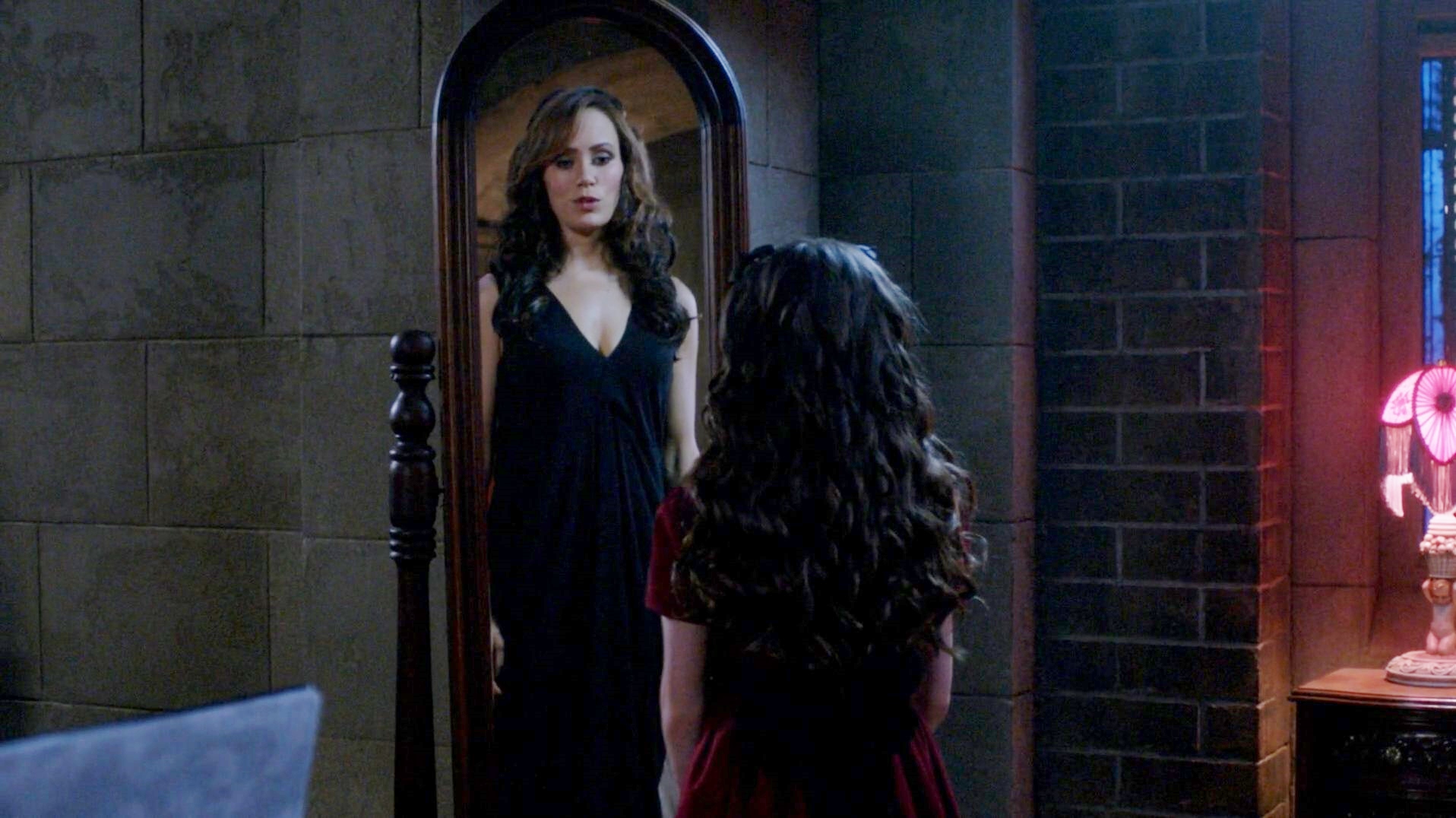
The Darkness would indeed have done things much differently. The how and what she’d change exactly remains mysterious and elusive. As she talks to her adult self in the mirror, she’s reminded that she has a purpose. She can’t undo what God has already done, but she can find a way to replace it or change it to her liking now that she is free. Her towering anger bodes poorly for the Natural Order God set up and then seemingly abandoned. No matter her true intent or her actual plans for the world and universal set up she means to put in place, it seems that it will always be colored by her intense anger at God.
After all, the adult form of the Darkness says, “I am what you are becoming, and we are mightier than God.”
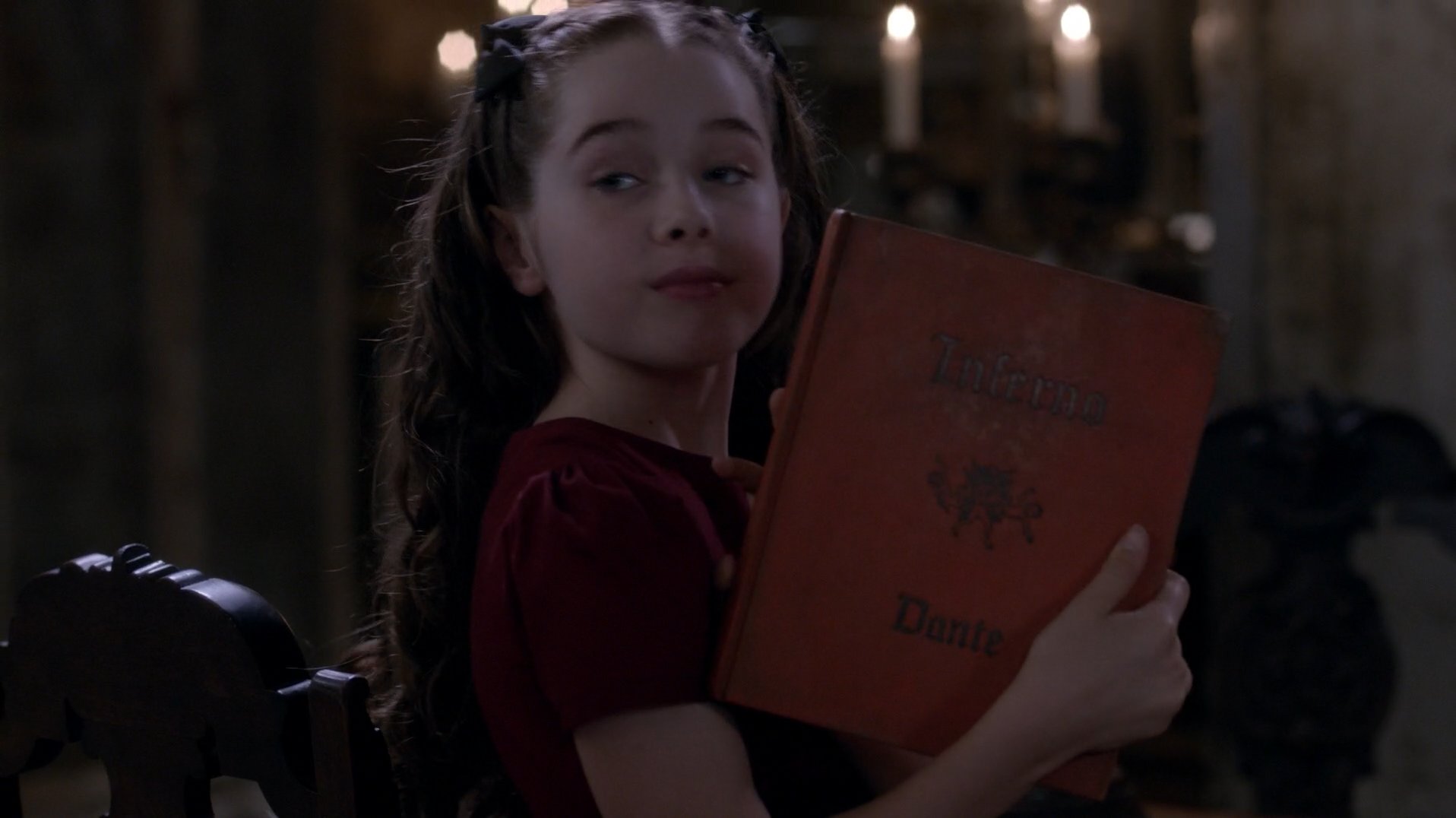
When Crowley returns later with a gift—a children’s book for her reading pleasure—Amara points out that her nanny has already given her a much much better gift: Dante’s Inferno—in the original Italian.
The Darkness may not be impressed with the current Natural Order, but by being gifted this particular text, she is given a key to its make up. She can see just how its been put together and see just where its flaws lie. Because so much of Supernatural‘s world view rests on this particular text, meta-fictionally speaking, she now knows enough about what God’s left behind and how to perhaps tear it apart to replace it with her own vision.
Crowley, probing more into her world view, states, “Yes, God’s plan is hideously flawed. But you and I together—well we can shape things to our own world view. A place where like the dinosaur virtue is extinct. Where the very air that we breathe is pure evil. Would you like that?” Amara finds that concept troubling—and beneath her. She retorts, “Good, evil, Heaven, Hell, people. It all seems so unimportant.”
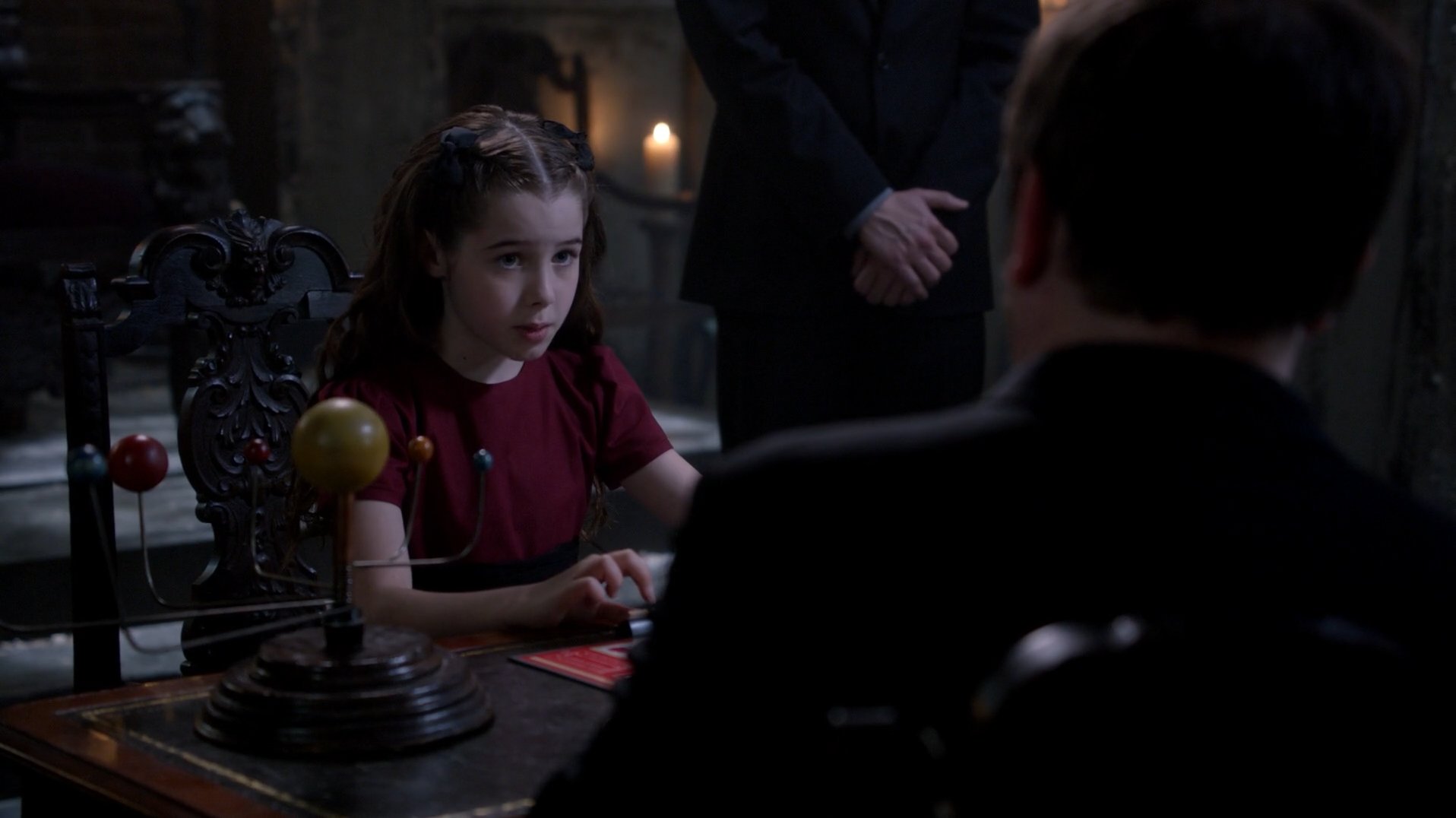
She’s also perplexed that God would have built a world in which people are destined to suffer and die. It’s not a concept that works for her. The idea that life is struggle and ends in the inevitably of death makes little sense to her. The why eludes the Darkness on so many levels. Why would anyone willingly choose to exist in a universe that will destroy them one day? How does this Natural Order work for anyone but God in the end?
Amara may see the Natural Order that God created as flawed and ruinous, but how does she impact it now? What does her action mean for its survival as she grows stronger? How does she disrupt it and threaten it?
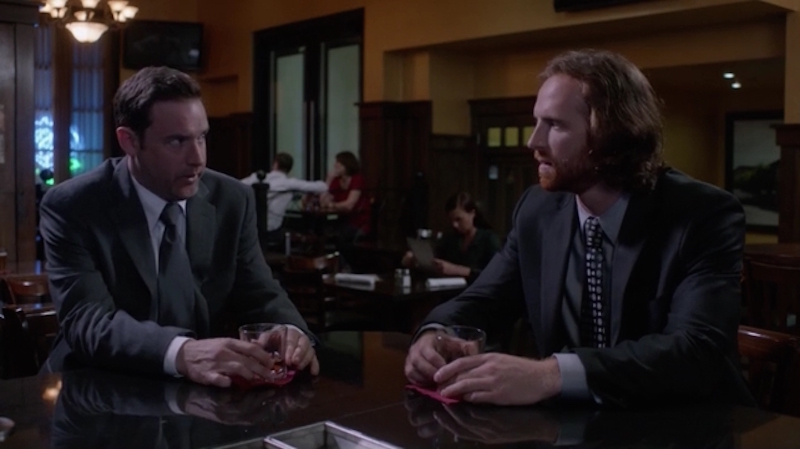
We see her impacting both Heaven and Hell directly when an angel and a demon meet up at a bar for a drink. They’re both shaken by what happened when the Darkness was released. Their realms both endured strife and alarm afterwards. These two may be nameless in the episode—they may be minor figures within the actual scheme of the Natural Order—and yet they are stand ins for their two races as they face down a terrible possibility: being rendered obsolete.
The demon remarks to the angel, “You know our two operations will always butt heads, that’s the set up. But this. We could be out of work.”
They know that the current Natural Order favors them—and so does Crowley. For all his lip service to Amara about having “whatever you want whenever you want,” he is studying her closely. He wants to know just how to take her out if necessary—going as far as to ask how God put the Darkness away in the first place. He wants her badly to be on his team, as a powerful weapon and ally that none can stand against—but the longer she remains at his court, the more he realizes she threatens not only his operation or his life, but the entire system that allowed him to rise at all.
Crowley is very much a Dante admirer. He likes the way the Natural Order works right now. He can twist human beings into evil creatures before they die, reap the power of their souls in Hell, and grow ever stronger. He admits to Amara, “Well, actually, now come to think of it if everyone was dark and damned wouldn’t be much of a challenge. Watching a human reject the light and embrace depravity, yes well, that’s where the gratification really is. Never gets old.” The Natural Order simply works for Crowley—just as it is. He really wouldn’t tweak much of it, knowing that doing so ends the fun. But then again, Crowley is as much a product of this set up as the anonymous demon. He, too, was once a human being who lived, died, and went to Hell to become a demon. It’s only natural that he would want to keep it going.
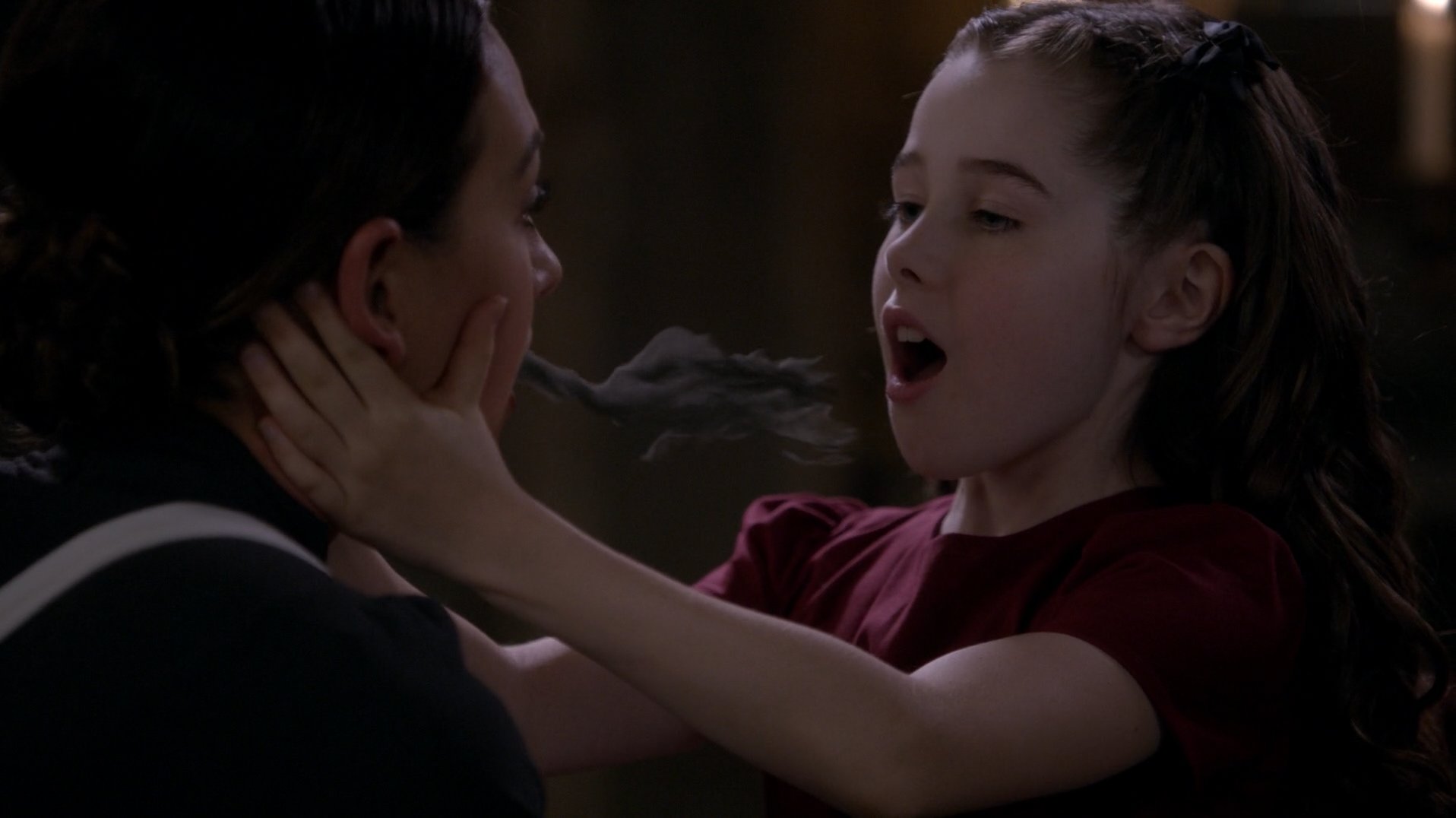
Amara, however, seems to be ever hungry. She wants souls, and she has no qualms about consuming demonic ones. She siphons them out of several individuals of Crowley’s court—going as far as to eat her own nannies. She tells Crowley, “Every time I take in a soul, I feel how much emptiness there is.” In many ways, this is an allusion to her own growing greed. She will not be sated until she’s consumed all of the souls this universe has to offer. She will, if allowed to do so unchecked, move through all three after life realms and consume them all. She will start with Hell and go from there—she’s already found that to her liking.
It is her real first threat to the Natural Order. By consuming souls, she’s consuming the very power source that makes it run. Each realm and their leader seems to only be as strong as its soul supply. If she consumes them all, she will be unstoppable. And yet, it makes one wonder about the Empty mentioned by Billie the Reaper. Is it possible that Amara is perhaps an embodiment of this Empty or is she something else entirely? Regardless, Amara threatens the Natural Order by choking its favorite fuel supply.
In a way, her other threat is her drive to replace what God has built with her own vision. It is clear that she doesn’t see herself as evil—all villains see themselves as the hero, after all. We’re left to wonder just what she will do and why she will do it.
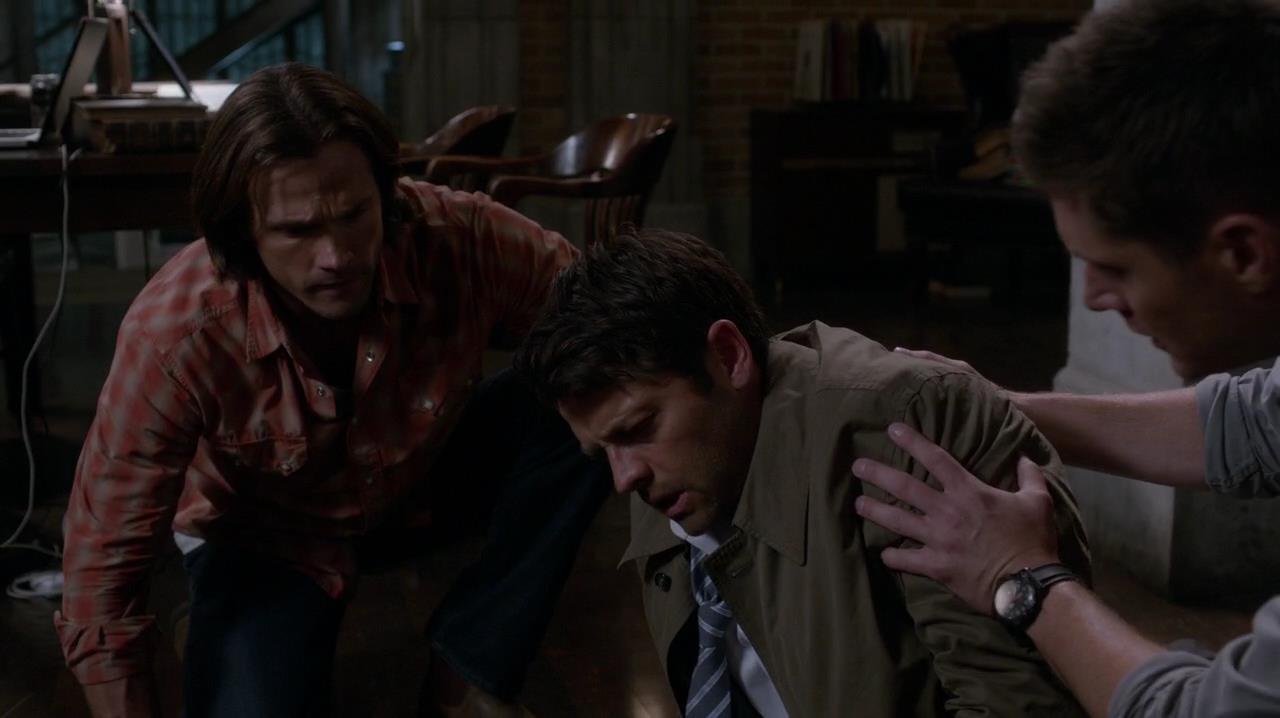
In the other story of “The Bad Seed,” we see Sam and Dean struggle to find a way to cure Castiel from Rowena’s spell. It seems, on the surface, unrelated to Amara’s growing power and her threat to the Natural Order, but when one looks closer, we can see that they indeed reflect one another beautifully. In fact, in their story we see the truth of God’s Natural Order within the Supernatural universe subtly told. For all of its Dante construct, there is a truth that eludes the likes of Amara and it explains why it is indeed a good system—one worth fighting to keep.
That truth is two fold: love and Free Will.
Rowena has disrupted Castiel’s grace and person with her attack dog spell. Rather than being able to control his actions, the angel is driven to kill anyone and everyone in his vicinity. He can’t stop this impulse no matter how hard he tries. Unlike the human victims Rowena has used this spell on, it will burn much slower in Castiel. As he sits in the chair, handcuffed and shivering under the blanket, Dean remarks to him, “Yeah, if you were a human, you’d be gone, but with you it’s like it’s digging deeper.” It’s attacking Castiel on a fundamental level, disrupting his own natural order.
The Winchesters finding a way to cure their angel friend may very well be a metaphor for so much yet to come in the season. After all, they can’t simply let it burn Castiel out from the inside. They can’t allow him to suffer this fate or have his natural self disrupted yet again. So, they’ll do what they must to fix him and fast.
After all, he’s a part of Team Free Will. He’s part of their family. They’re not just doing it to keep Castiel from killing others—another shout out to saving all the people, this time from a spell on their friend—it’s about their own love and affection for the angel. He’s been with them now for so long that they can’t simply sit by and let him suffer when he’s asked for help. Further to the point, it’s simply the right thing to do. While Castiel may not be a human being, he’s still someone, so they will save him.
That means finding Rowena.
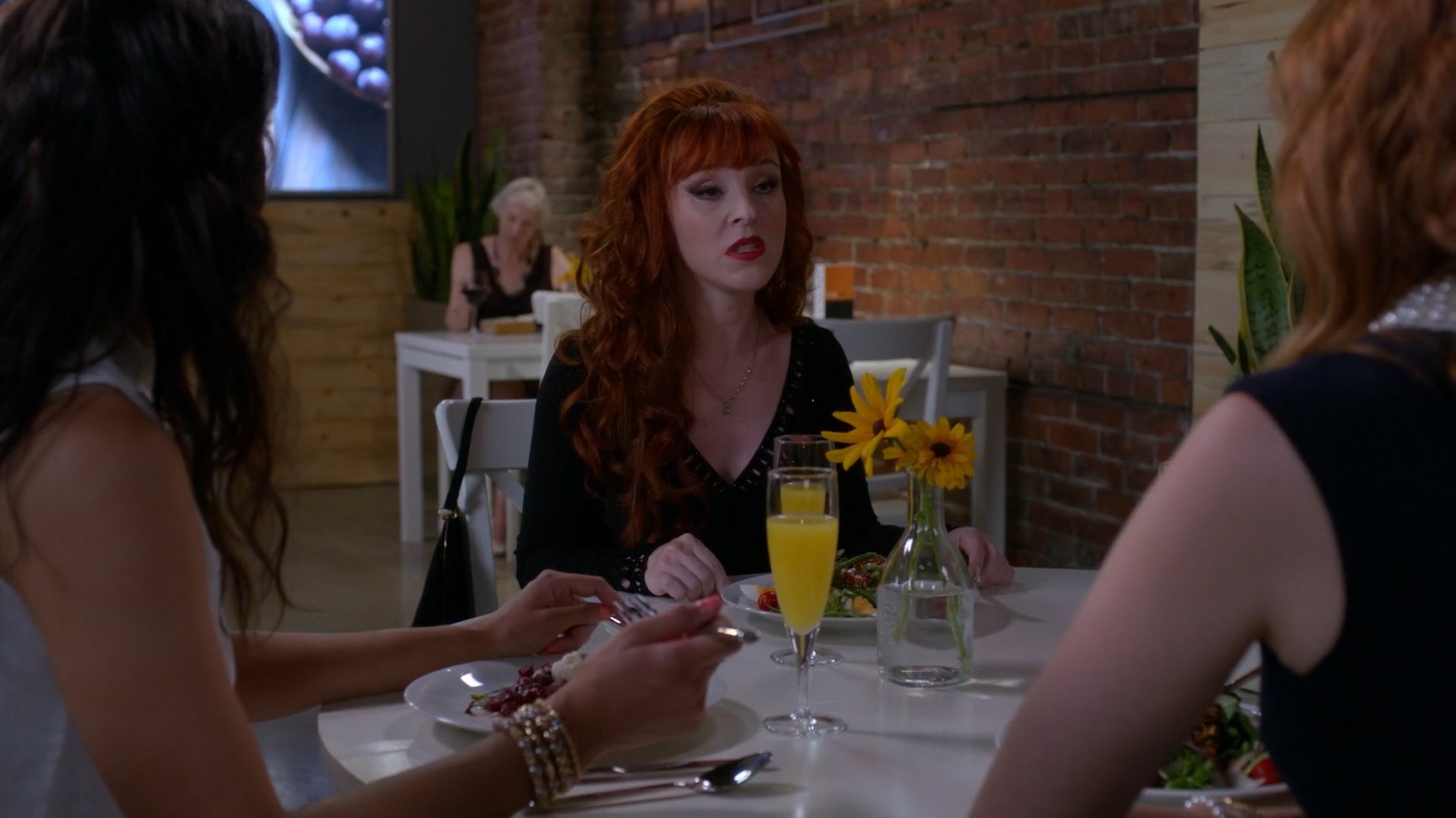
Rowena is on the move after casting the spell to remove the Mark of Cain. She’s recruiting and trying to replace the Grand Coven with one of her own—the Mega Coven. So far no one she’s talking to seems interested in her offers of greater power and a restoration to prestige in the world. One witch points out to her that “Well, we were being burned or hung by the thousands—it put a lid on our enthusiasm.” Nevertheless, Rowena wants to build a powerful coalition so she can take the next step in acquiring her power.
Unfortunately for her, her spell to kill Crowley has failed. She is bragging about having “guts and chops” by telling her recruits that she managed to kill her son, the King of Hell by forcing an angel to do it. They promptly break that illusion by telling her, “I have a friend who cut a deal with Crowley only yesterday. Crowley didn’t look so dead.”
So, now Rowena knows she’s on the top of Crowley’s list and has to find a way to hide from him. Her display of power as she makes her get away garners her new unwanted attention, however, in Sam and Dean. They know that she is the only person that can cure Castiel. She can reverse the spell and return him back to normal—just as the Winchesters must find a way to lock up the Darkness and restore the Natural Order themselves.
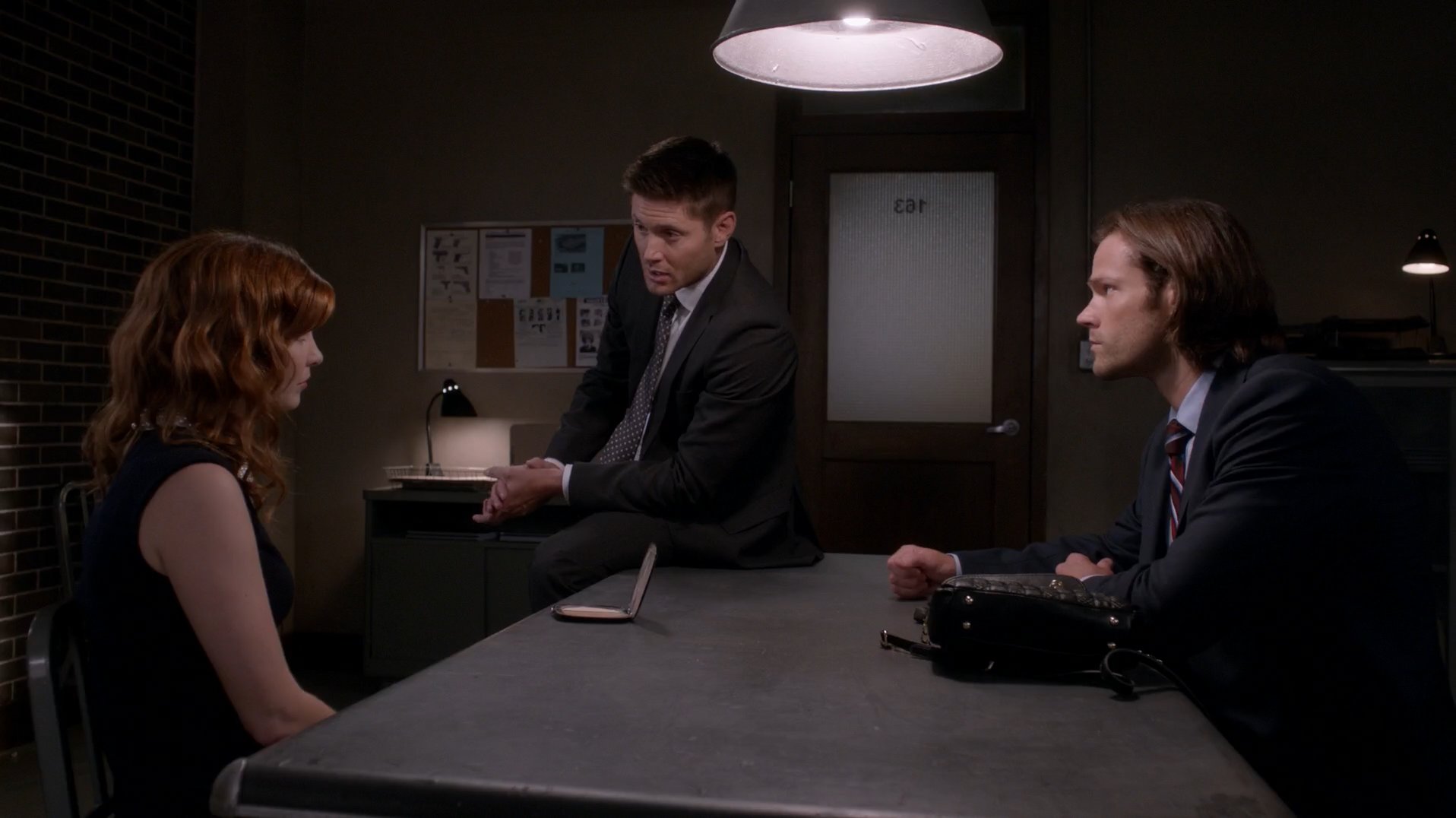
It leads them to interrogate one of Rowena’s witch recruits, and she scries a way for them to find her before she can make a clean get away out of the country. Not only does she hold the key to restoring Castiel, after all, the witch also possesses the Book of the Damned, a tool the Winchesters don’t want her to have any longer. It is too dangerous to leave it with her—and she, by having it, also poses her own threat to the Natural Order in many regards. Any number of its spells and its darker magics could easily allow Rowena to disrupt things on a global scale. It would allow her—a petty, conniving, and cruel person—power to punish her enemies with dangerous magic all at the whims of her emotions.
The Winchesters manage to not only track her down, they manage to lock her in their dungeon and demand that she cure Castiel. Rowena, never one to do anything for free, starts to negotiate immediately. Unlike Crowley’s dry wit and quid pro quo, Rowena seems to enjoy toying with them in a completely different way. As the brothers tell her what they want her to do, she turns the tables, remarking, “Call him. If I’m dead, you’ve got a big fat pile of nothing. No book—ever. Your friend with the bent halo, he goes foaming at the mouth mad and dies. Your turn.”
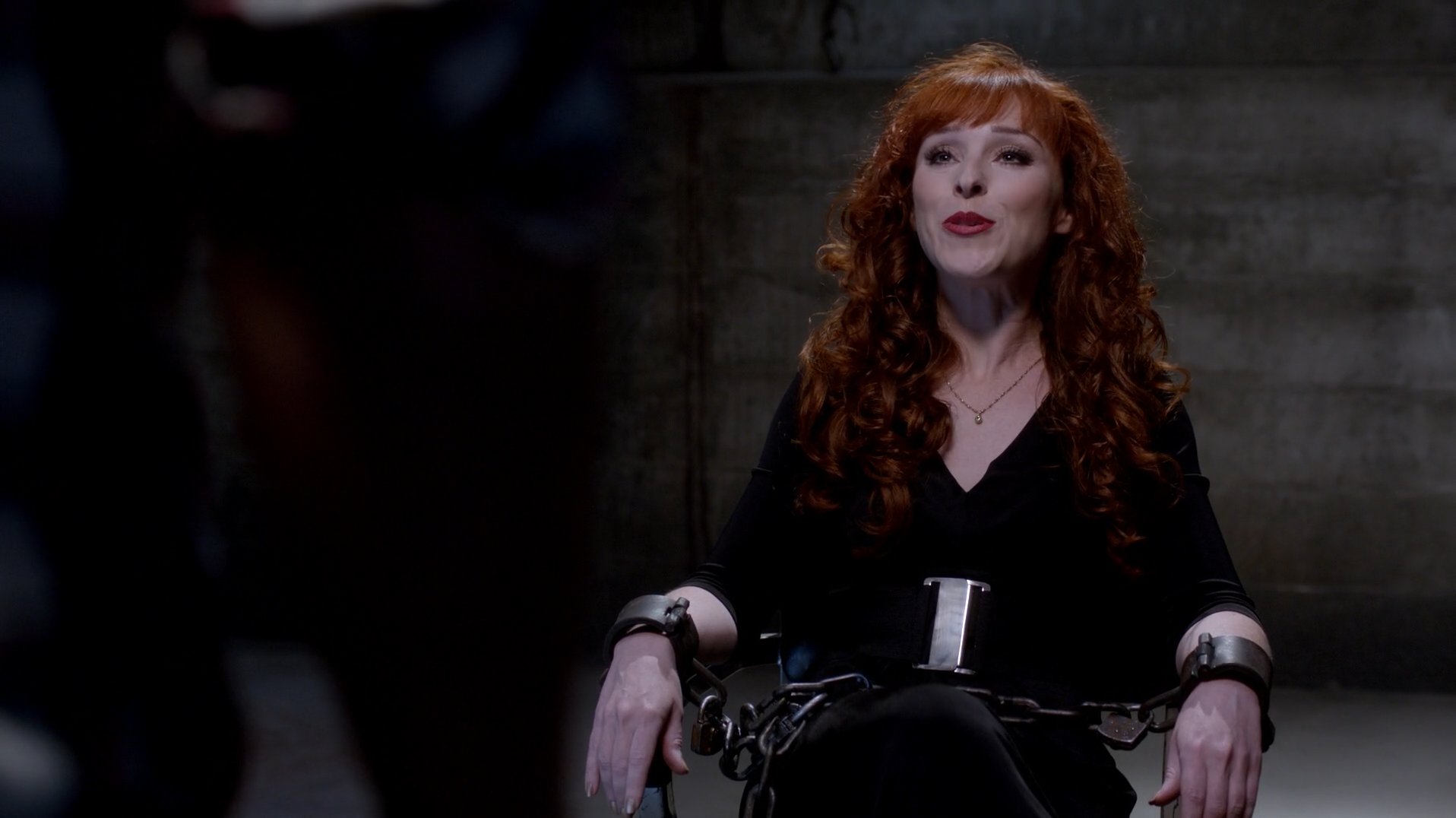
Rowena, even in chains, knows she has the Winchesters at a disadvantage. She wants her freedom, yes, but she knows that they cannot hold her hostage forever. They, on the other hand, do not have all the time in the world to save Castiel. Either they give into her demands, or they watch the angel die a painful and slow death—as evidenced by his seizure and loss of control.
While they fight to keep her in the dungeon and wring what they want out of her, Castiel succumbs even more to her spell and breaks free. He is driven simply to kill and attack and he goes after anyone that moves without discrimination. It is an obvious tie to the same effect that the Darkness had on the rabids, driving them to kill and main. And much like them, Castiel will only stop when he drops dead—literally.
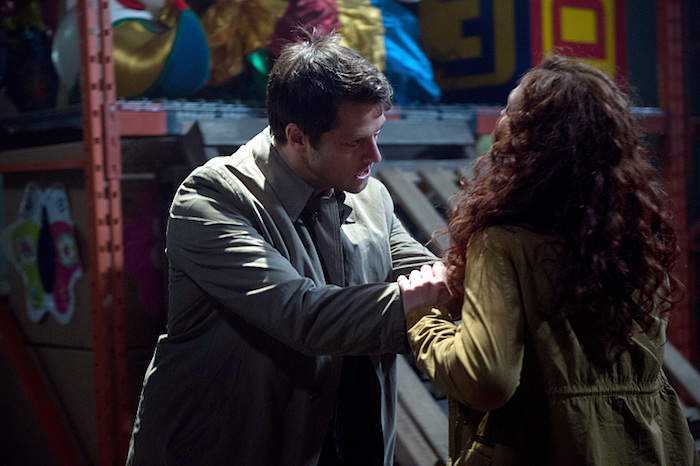
Even though he’s so far gone at this stage, it’s clear that the angel knows it. Castiel staggers after a woman, chasing her all the way into a maze of a building, cornering her. There’s no human weapon that can slow him down, and he will kill her without question. Interestingly enough, he doesn’t do this with his grace. He doesn’t kill her with any angelic means—instead, he starts to choke her to death. It’s as if by using his bare hands he’s trying to buy some time. He has to know that the Winchesters are on his tail and will quickly find him—hopefully with enough time to save them both.
Luckily, he guesses right and the brothers show up just as he’s about to strangle the woman to death. Unable to stop attacking, once he drops the woman, Castiel turns his sights onto another target: Dean himself. He starts to beat on the elder Winchester, his rage prevalent and out of control. Much like with the woman, Castiel prefers to use his fists here rather than his blade or his grace. He will pummel Dean to death.
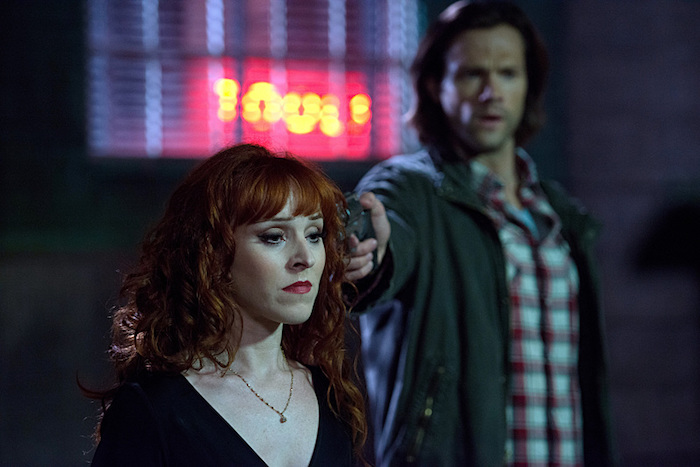
Sam, holding a gun to Rowena’s head, makes her undo the spell making Castiel rage. She does it, allowing Castiel to finally stop. That doesn’t mean, however, that she will allow them to break their deal. They never actually promised to let her go, and she knows it. Dealing with the Winchesters always gets one burned, and so she makes use of her unfettered magic to make a clean get away. Swiftly, she disarms Sam, slams a gate down, and flees the scene.
The saving of Castiel by the Winchesters—even if they did have to threaten Rowena’s life to do it—builds on the concepts of the first two episodes. Their attempt to save Castiel here didn’t end with collateral damages as it has so often in the last few years. The woman that the angel was attacking got away. She may have some bruises and be psychologically scarred by what happened—but she’s indeed alive. They managed to do both here: save Castiel and keep an innocent person from dying. It means they can perhaps keep on the path to “saving people” rather than just “hunting things.”
Sam and Dean’s investigation and search for Rowena also shows that they’re more about saving people than simply hunting things, too. After all, the woman they meet at the police station is a witch. We’re not told how old she is, how long she’s been practicing, or if she’s ever killed anyone with her magic, but we do know she’s a witch. In the past, Dean would have killed her once he got what he wanted—certain that she had indeed done something worth dying over. Surely, he would have reasoned, she had used her magic to kill others at some point.
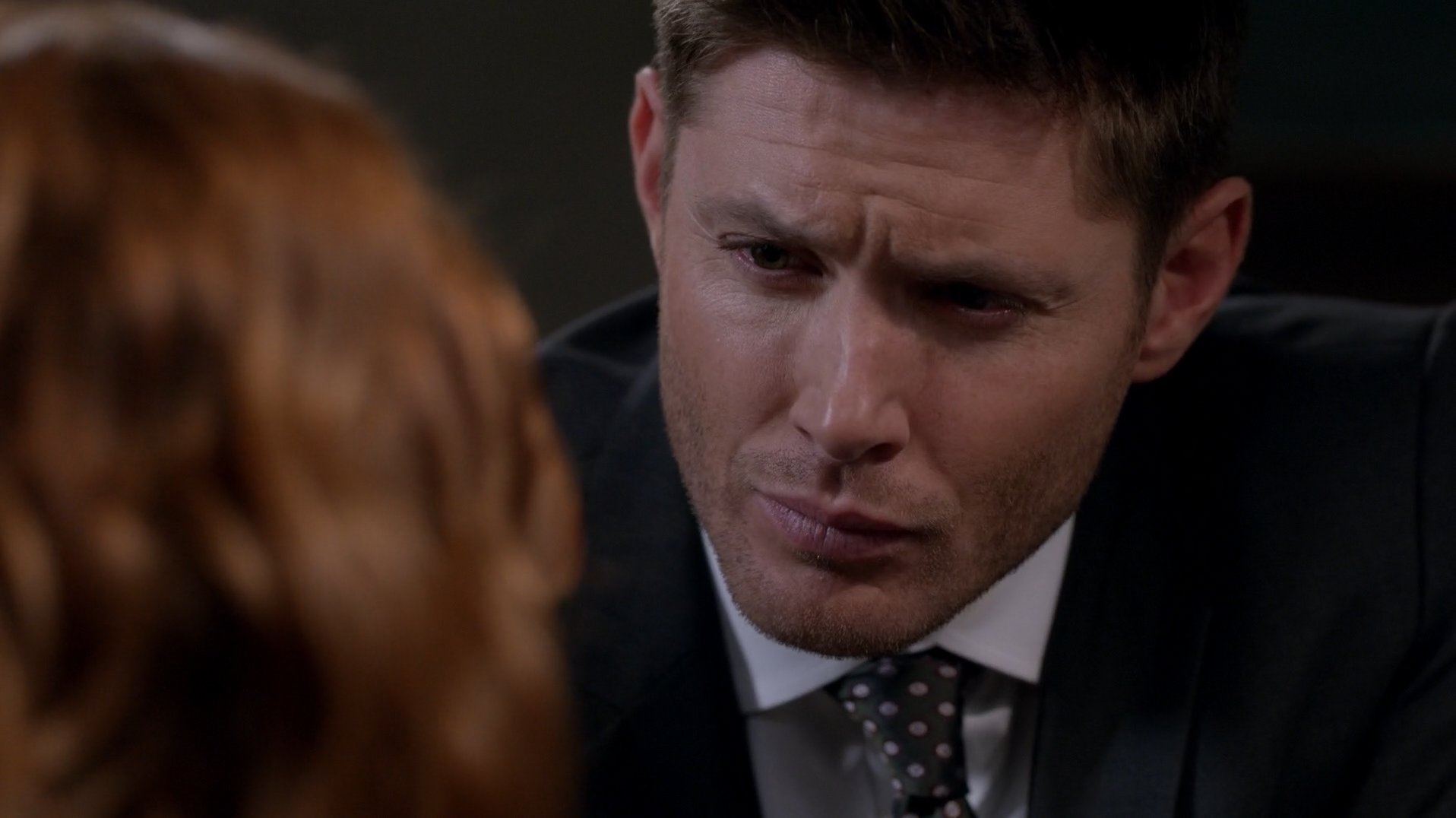
Instead, Sam and Dean get what they want and do not kill her. It’s a subtle shift. They’re not her allies and they’re not exactly polite to her, but unless she’s done something evil in the recent past, they won’t go after her. Dean tells her, “Before you finish what you’re about to say, know that we are the only thing between you and Crowley’s ninjas.”
And Castiel’s restoration itself shows that Sam and Dean are willing to save people—even angels—from anything evil. They restored Castiel’s natural order, showing that they are to champion the Natural Order God has left behind.
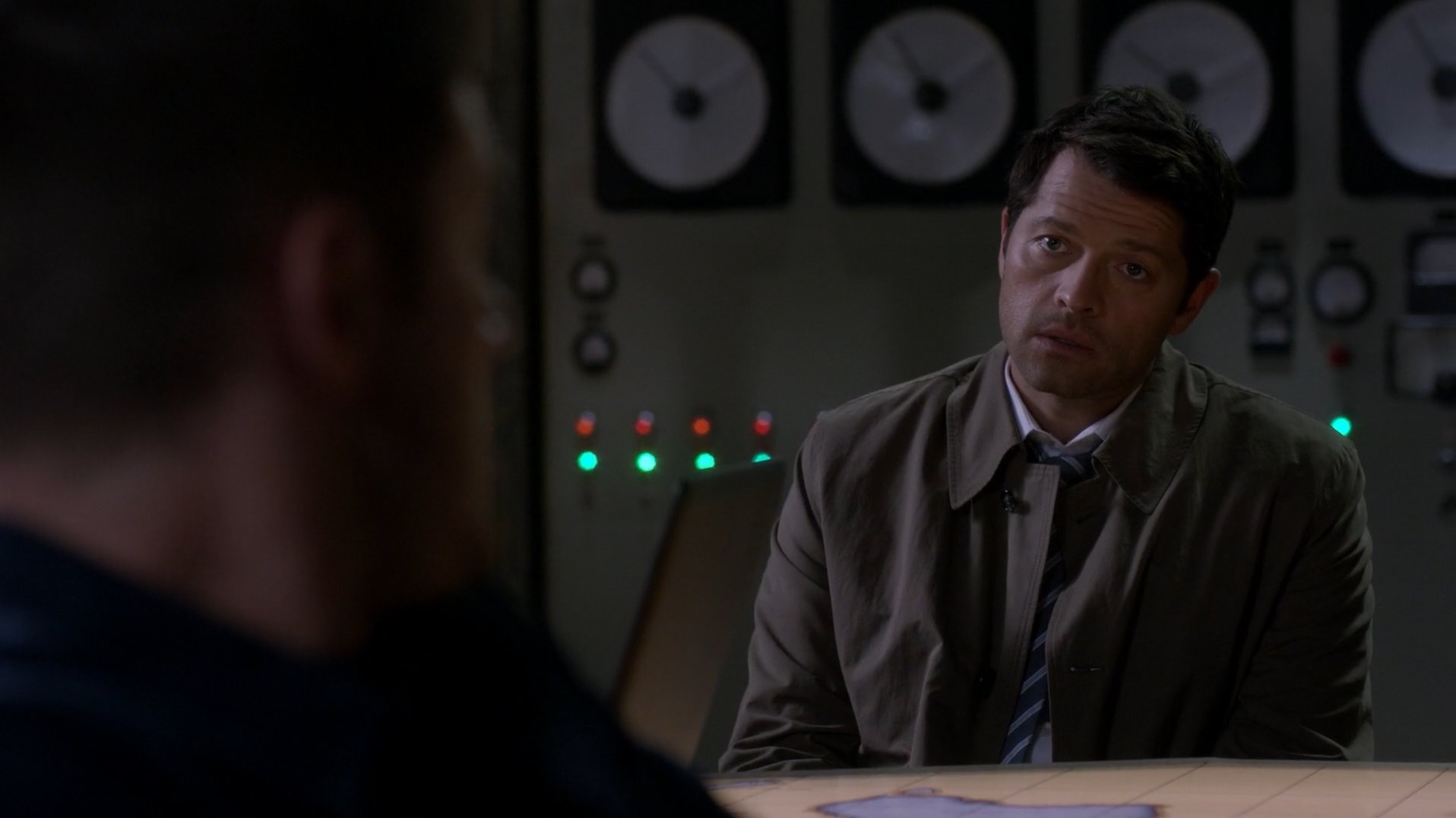
This is an unusual place for the Winchesters to be. After all, they are the grand disruptors of the Natural Order and have been for all eleven seasons. They’ve dodged death, resurrected each other, and traveled through all three Dante realms and back more than once. Sam and Dean have manipulated that Dante construct to their own making, allowing for their own lives to remain intact and their efforts to hunt things carry forward. Death once told Dean, “You and your brother keep coming back. You’re an affront to the balance of the universe, and you cause disruption on a global scale.”
With the release of the Darkness, that hasn’t changed. It was their actions—Dean acquiring the Mark and Sam’s drive to remove it—that led to this, after all.
What also hasn’t changed is their reasoning for standing up as the Natural Order’s champion. When faced with the impending Apocalypse, with the possibility of the grand prize fight between Michael and Lucifer, the Winchesters chose to throw out that script. Rather than usher in the so-called era of Paradise once Michael slew Lucifer, Sam and Dean decided to simply put Lucifer back where he belongs.
Amara sees the system that God left behind as merely a construct that fails on many levels. She sees it as a realm made of suffering souls where they live and die and seemingly do so with little to no point. Amara grasps the complexity of God’s grand scheme easily in her studies—and every soul she consumes reveals more emptiness and pointlessness, but she’s still missing the grand point God was making.
It’s never been about suffering. It’s not really about good and evil. It’s about free will and the rewards of love. In that way, Sam and Dean are the perfect agents of God’s actual Natural Order. They will defend those two elements every time—and at all costs. It is not something Amara can find in Dante or in any of the videos she’s watched.
It is, however, something Sam and Dean both innately know and will use to their advantage time and time again—and in the end, that is why they will triumph: for love and free will of all.


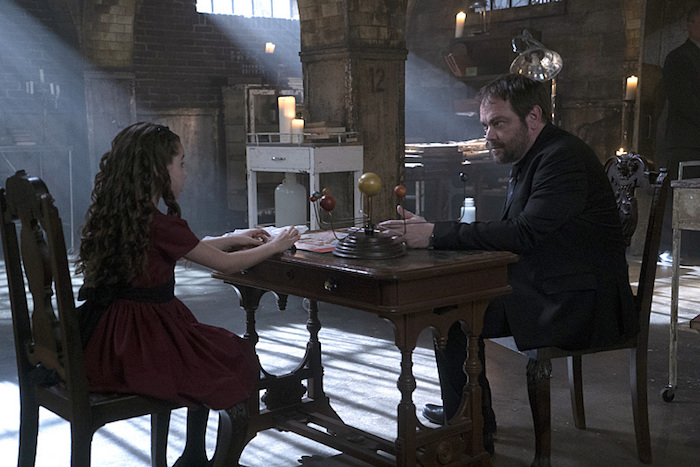
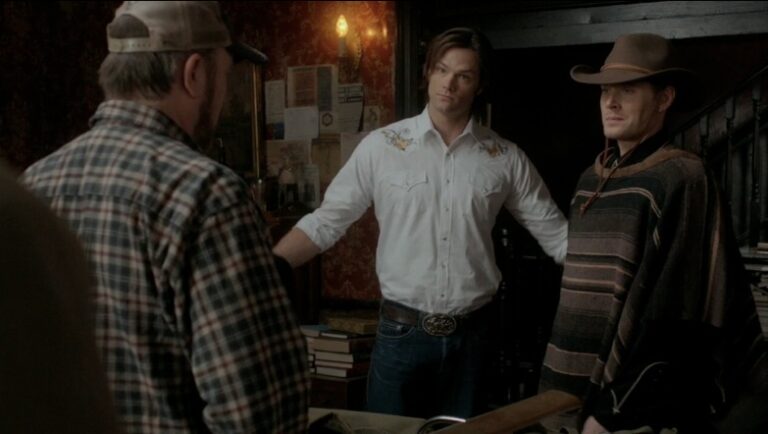
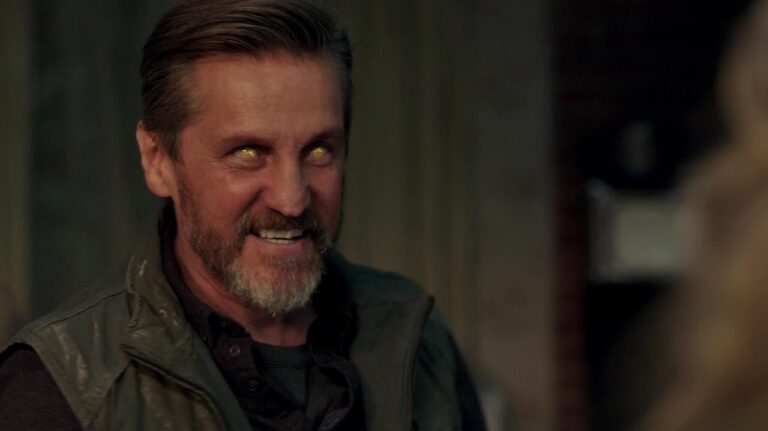
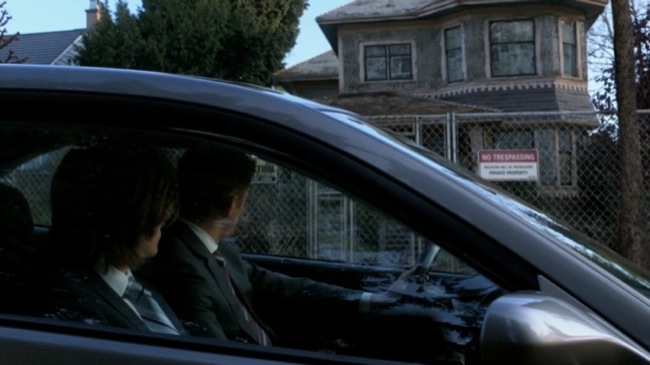
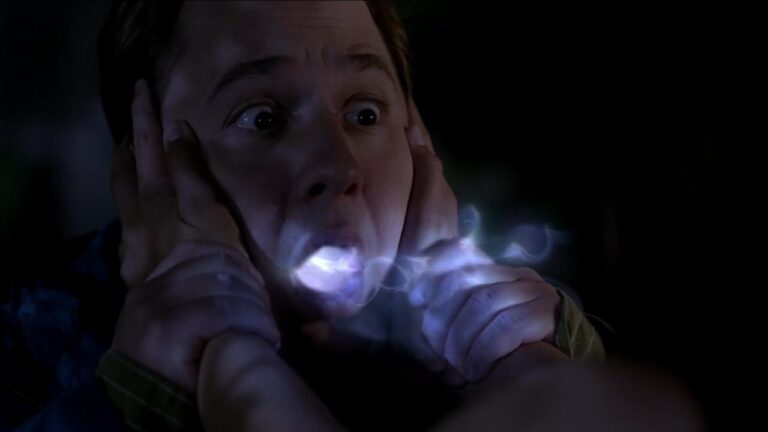
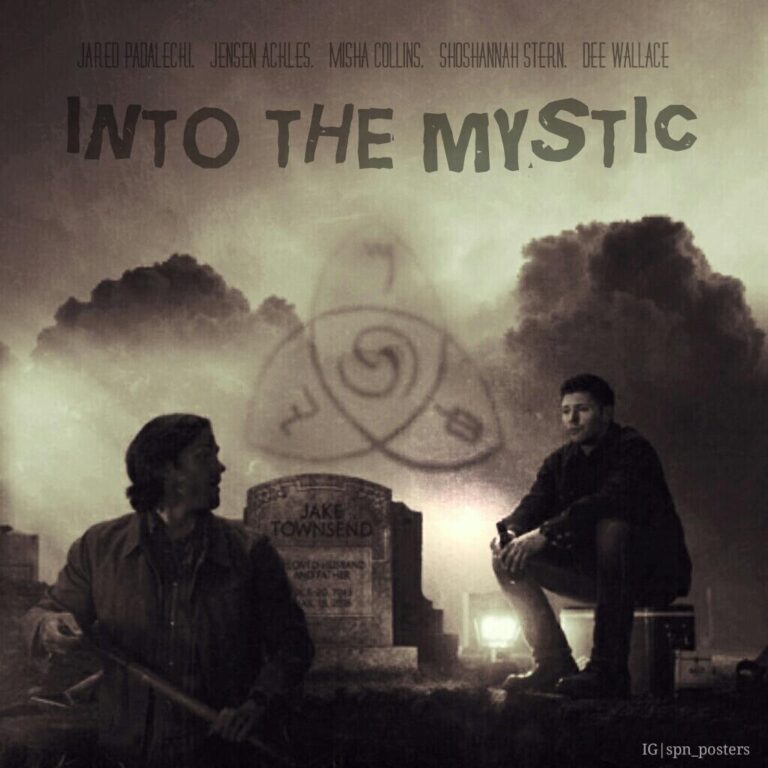
*claps hands like an 8 yr old*
Yes! Yes! You’ve captured the theme so very well! And the use of Dante’s Inferno as a framework is perfect. Well done – AGAIN.
But I MUST add that we have another element of the Natural Order and that is Rowena. She said to the witches at lunch, when talking about possessing the Book of the Damned: “It’s secrets are making me a [b]force of nature[/b] girls. A [b]force of nature[/b].” She even repeats it, JUST in case we missed it. This, to me, ties perfectly in with what you are saying about the upcoming battles. Crowley called Amara a “Primal”. She too is a force of nature – but a different kind of nature, one of HER making. Rowena, probably much to her chagrin, is a force of nature of the Natural Order that God created. Now it’s possible that she can switch teams and support Amara, but I’m going to guess that Rowena – who works on an elemental level of natural power – is going to have to be Team God (as opposed to Team Darkness).
I find this delicious.
I also like your comment about Cas using his bare hands. He too was put into a more base state — a beast – where he was simply all force and little to no thinking when he was in attack mode. Raw power.
Finally, bravo on pointing out that there were less human deaths in the Winchester wake. I agree, this is “back to basics” for them. I’m not quite sure Dean would have killed the witch without SOME indication that she had killed people, but I agree they clearly kept the body count down. I like that.
Another superb write-up. Thanks for pulling this all together.
Thanks for the comment.
I’m glad you enjoyed this take. I’m an unabashed Dante nerd. I’ve probably read the Inferno one too many times, but hey. This show uses Dante really well and has laced it through the story without having to be too medieval or too overt. Dante endures mostly because his construct ignites the imagination. It’s nice to see a modern medium like television use some of those elements to make them fresh and new and yet stand on that old bedrock we see in his text.
As for Rowena, I can’t imagine she’d want this Darkness to triumph. You’re right. She’s most certainly on Team God or Team Natural Order. She disrupts it herself, but at the same time it’s because she knows how the rules work within its construct. Amara most likely would destroy that fabric and leave someone like Rowena powerless—or worse. With Amara’s growing hunger, I don’t doubt she’d just eat up our witch.
As for Cas, it’s something I noticed mostly on my second viewing. It struck met hat he was strangling her, that he went straight for that than drawing his blade. It wasn’t even in his hand at the time. I don’t know if he had it taken away at some point in the whole lock down phase they had, but I couldn’t help but notice he didn’t have it at hand. And he didn’t put his palm on her forehead, either. He could have just as easily blown her eyes out and burned her up. He didn’t. It was a very base and beast like thing to do.
And yes, Dean might have had to see evidence that this witch was actively killing perhaps to make more moves, but I noticed in their exchange that they were keeping her safe from Crowley and other demons. They didn’t want her, they wanted Rowena. Why kill her after getting what they wanted? It just doesn’t serve a purpose.
Thanks again.
I’m learning very slowly to read everybodys reviews before makeing comment. I did orginally have some negative thoughts on this Episode, and agreed with other writers analysis, but everyone has their own opinion or ideas So Thank you everyone. I like the way you have pulled everything together Far Away Eyes – and you have given me another perspective. Thank you
Thanks for the comment.
I’m glad you liked this one and that it gave you some fresh perspective. I hope it made some of the episode better for you. I just try to understand the story as presented, and I’m glad I could make some things clearer for you. I hope you’ll keep reading!
Thanks again.
Thanks, Far Away Eyes, for a very precise analysis of the ideas embedded in the episode as well as in the whole show. My ideas about the Darkness are exactly the same as well as the true meaning of the Natural Order of Things. And I think that Amara will justify her devouring the world by something like “better not to be born than die an awful death”, or “better not to live, than live and suffer”.
Thanks for the comment.
I’m glad you enjoyed this analysis so much. It was a fun one to write and considering how much I love Dante I loved seeing a big tome of the Inferno hoisted up. It just made sense the more I thought about it that the Natural Order is a Dante-ish structure. I think you’re right. Amara will destroy the world so she can replace it with her own view. I think the better not to be born concept also fits well for her. She thinks its folly for humans to live in this world and I can’t imagine she’ll create anything like humans if given the chance. So, for her, eliminating the world and life that God created makes sense. It’ll be intriguing to see what her real end game ends up being as we go along, though.
Thanks again.
FAE, once again I loved the way you tied the events of the episode together. I did not really like this episode, but not because of the plotting per se. In fact, it had many of the elements that I had expected and hoped for once the Darkness was unleashed. I assumed that at some point Heaven and Hell would decide to work together against this new threat. It makes sense that Rowena would try to acquire some minions to increase her own power as well as for protection. And I love that the D is not the stereotypical big bad with the same familiar agendas of all of the previous big bads. But to me the episode was quite lacking in the execution of these ideas. I found the dialogue clunky and cartoony for the most part and a lot of the acting was sub par. What bothered me the most was the child Amara. While her dialogue with Crowley should have been the most compelling part of the episode, since we were finally getting some insight into her thoughts, all I could think was “THIS is the fearsome Darkness?” But you did help me sort out my feelings about the “souls as food” issue. It had bothered me that this pre-biblical force of immense power would require souls as food, given that souls did not even exist when she was at the height of her power. But I loved your take on this:
[quote]By consuming souls, she’s consuming the very power source that makes it run[/quote]
It makes sense that she’s consuming souls not necessarily because she requires it as food, but because through his creation of man God designated souls as a source of enormous power in the universe. She is trying to undo all that God wrought, rather than merely feeding herself. So as usual, I have adjusted some of my feelings based on your review! Thanks for offering such thought-provoking insights.
Thanks for the comment.
I’m glad I could help perhaps change some of your feelings/views on the episode. I enjoyed it, but wouldn’t necessarily cite it as a fave, either. I like the fact that Dante/Natural Order seems to be the struggle this season. Amara comes off as a mysterious figure so far for me. I haven’t decided how I feel about her. I, too, like that she doesn’t seem to fit the mold of some of the other big bads. Her agenda is to destroy what God built, so I’m glad I could help with that. I could be wrong, but it’s how I saw her character based on the conversation she has with her adult self in the mirror. The Darkness wants to tear God’s universe apart, so why not consume all the souls?
I hope that I can continue to write reviews that help with the episode. I always approach the episode with the question: what did the story say to me? What is it doing? I go from there and see what comes out. It’s almost always a surprise to me what I end up with, too.
Thanks again.